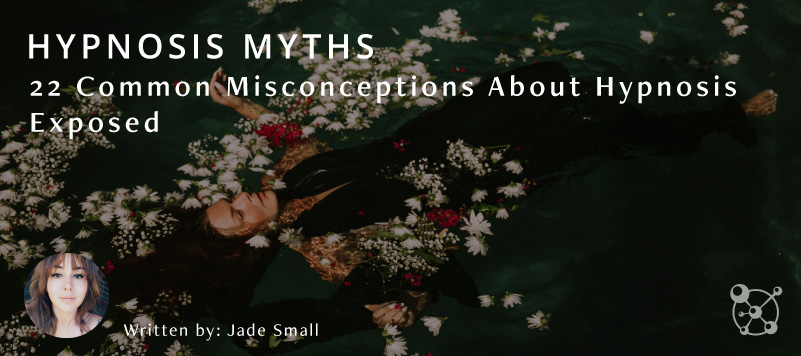Hypnotic trance, the subconscious mind, self-hypnosis, hypnotherapy, trance state, and hypnotic suggestions. These are a few of the phrases that revolve around the concept of hypnosis. But, what is hypnotherapy, really? There are so many hypnosis myths that are circling us daily, and the internet does not help either because false information is shared like wildfire! Let’s dive into the fantasy world of hypnosis.
Table of Contents
22 hypnosis myths & misconceptions
Many of us have had the privilege to attend a live-stage hypnosis show at some point in our lives. As funny as it may be to watch our friends and family perform and behave in such ways and do the craziest activities whilst completely oblivious to their actions, it is easy to see why there are so many misconceptions about hypnotherapy. Read on for 22 hypnosis facts.
 1. You can be hypnotized against your will
1. You can be hypnotized against your will
This first myth is very important because so many people still believe to this day that hypnotism is something to fear because it could happen at a point, and against your will. A hypnotherapist is not a vampire with glimmer abilities or a mutant with special powers. Contrary to what stage hypnotism might lead you to believe, you need to be fully aware of the process, and you remain so throughout.
2. You can get stuck in hypnosis
Myth #2 is that you can get stuck in hypnosis, yet this is truly not the case. You are in control of the hypnosis session, not the clinician, and you are able to snap out of it whenever you want.
3. You can hypnotize someone while they are sleeping
Myth #3 has the idea that you can hypnotize someone while they are sleeping – and it is completely false! This is a two-party form of psychotherapy, and the person being hypnotized needs to be aware, open, and willing for them to slip into the hypnotic trance state.
4. Not Everyone can be hypnotized
This is a hard factor to investigate. In the past, the belief around hypnosis was that only 50% of the world’s population could be hypnotized, but many techniques have been developed and tested so that everyone can experience this phenomenon.
5. Hypnosis can damage your brain
Hypnosis is not harmful in the slightest. A hypnotherapist will induce the hypnotic state of mind to help deal with memories without causing stress on the brain and body.
 6. Hypnosis is not just all About your Past lives
6. Hypnosis is not just all About your Past lives
7. People under hypnosis Are Under a Spell
It might be able to trigger a healthy lifestyle for success with weight loss, and it might be able to come to the aid of your cravings whilst you are in the throes of quitting cigarettes, but that does not mean they are under a spell, just made aware of their bad habits.
8. Hypnotized people Can be Made to Do things Against Their Will
A hypnotherapist will never be able to make you do something that you do not want to, you are not blind throughout the process, and you maintain your free will throughout.
9. Hypnotherapy is a once-off Cure
Psychotherapy is a process, and revealing your hidden fears is not as easy as simply going under hypnosis. You will need to accompany it will be other forms of therapy where you can learn to cope with these new revelations, as well as integrate them into your life.
10. No one Remembers Their Hypnosis Sessions
When you go into your hypnotic state of mind, you will have a heightened sense of awareness and with that, you will remember everything that you saw whilst you were hypnotized.
 11. Only “Weak-minded” People Can be Hypnotised
11. Only “Weak-minded” People Can be Hypnotised
It has been said that the most hypnotizable person is someone who is outgoing, confident, and has the ability to truly dive into whatever situation they are facing and become a part of that experience, but that does not mean that they are weak-minded.
12. Hypnosis is like Sleeping
It is very possible that one might fall asleep whilst they are under hypnosis, especially if the patient has had a long day, and they are tired. However, hypnosis is not like sleeping at all, because you are consciously aware of your surroundings at all times, even though your eyes are closed.
13. Hypnosis Can Reveal True Memories
Different types of hypnosis. Hypnosis can help you to see your memories more clearly, and it could bring up a wave of emotions that come with those memories, but there is very little evidence to support this. On the other hand, hypnosis has been said to create memories, and they are triggered by the hypnotist’s suggestions.
14. Hypnotic Suggestibility is Similar to Mindfulness
While hypnotic suggestibility occurs when you are in a state of relaxation, just as you would be in for mindfulness meditation. Where hypnotic suggestibility will suggest events like a memory trigger and your mind can spontaneously discover more from that memory, mindfulness is different because it calls for awareness of your spontaneous thoughts and memories.
15.Hypnosis is Magic!
This is far from the truth. A hypnotherapy session is a form of psychotherapy, there is no magic spell or incantation, although a stage hypnotist will have you believe otherwise.
16. “I Cannot Be Hypnotized”
There haven’t been a lot of studies done on the level of suggestibility in people, and it is not an easy thing to measure. Everyone can be hypnotized to some degree, you just need to be open to it.
17. Self-Hypnosis is the Same as going to a Professional
You should let a trained hypnotherapist guide you through a view session before you attempt to heal yourself with hypnosis. If you attempted self-hypnosis with any negative thought patterns, you could enhance them and make the situation worse.
18. Hypnosis is Like Meditating
What is the difference between meditation vs hypnosis? It might be easy to assume that hypnosis is the same as meditating, but please understand that even though you use meditating techniques to get into a calm state of being for the hypnosis to be induced, the two are not the same.
 19. You can Use Hypnosis to Make a Suspect Confess
19. You can Use Hypnosis to Make a Suspect Confess
Of course, this is not true, and you might have realized this when we spoke of the fact that your awareness is heightened, and you cannot be made to do something you do not want to do.
20. “Focuses on Attention” is Necessary
You do not need focused attention in order for the session to be successful. You can maintain your awareness of your surroundings without having to block them out, and you will still be able to be hypnotized successfully.
21. People Who Have been Hypnotized can Slip back In Without Warning
Just because you have been hypnotized in the past, does not mean that you have been on the verge of a hypnotic state at all times.
22. Responding to Hypnotic Suggestions Means you are Faking
Just because someone reacts well to the hypnotic suggestibility and responds accordingly, does not mean that they are faking. Just as we are unique individuals, we all have unique ways of reacting whilst hypnotized.
Key takeaways on hypnosis misconceptions & myths
As you can see, there are so many different, and occasionally absurd, misconceptions about hypnosis out there. If you were one who believed any of the above-mentioned hypnosis myths, then we hope that you found this information well, and have a brighter opinion of what hypnosis can and cannot do.
Resources
Interested in becoming a QHHT Practitioner?
Find out how YOU can become a QHHT Practitioner. We offer an entire online course journey to get you started, growing, and achieving your goals.


Jade Small
I am a creative and a wanderer. Mysteries and connections are what inspire me to write. While on my path, my purpose is to bring you information to help inspire you on your journey on this place called earth.
See more from these categories
Read similar posts

Wondering How to Trust the Universe When Things Go Wrong? It’s natural to feel lost when life doesn’t go as planned. However, learning how to have faith in the universe can transform your perspective. This practice involves believing…Read More»

In the realm of metaphysical literature, few names resonate as profoundly as Dolores Cannon. A luminary in the world of hypnosis and regression therapy, Dolores Cannon captivated readers with her unique ability to unlock the…Read More»






Leave a Reply
You must be logged in to post a comment.